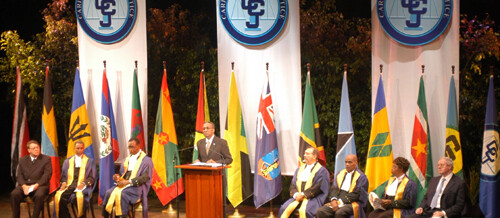
KINGSTON – President of the Jamaica Bar Association (JBA) Ian Wilkinson says he believes it will be a “retrograde step” if the country decides to establish its own final court of appeal rather than seek to join the Trinidad-based Caribbean Court of Justice (CCJ).
In an interview with the Jamaica Observer newspaper, Wilkinson said that any contemplation of going that route would amount to a backward step which would be of little benefit to Jamaica.
“I think that it would be a retrograde step to try and have Jamaica having its final court of appeal being a Jamaican court,” Wilkinson said.
Prime Minister Bruce Golding in February hinted that his Jamaica Labour Party (JLP) administration was exploring the possibility of Jamaica having its own final appellate court. Golding later said his remarks had been taken out of context.
Most of the Caribbean Community (CARICOM) countries have joined the original jurisdiction of the CCJ that also serves as an international tribunal interpreting the Revised Treaty of Chaguaramus that governs the 15-member regional grouping. However, only Barbados, Guyana and Belize are members of the CCJ’s appellate jurisdiction.
Wilkinson, who describes himself as a regionalist, said that all things point to the CCJ, established in 2001, as the court which would deliver justice to Caribbean people, as long as certain structures were in place.
“This has been canvassed by many legal luminaries. Studies have been done, research has been done and the views of many have been canvassed and the majority view is that that is not the way to go, so why would you want to do such a thing?
“The prime minister is giving the impression that he was taken out of context when he made the statement, but I saw the clip when he made the announcement and I saw an exchange in Parliament.
“Many Caribbean leaders have already come out against it, including Kenny Anthony of St Lucia and Tillman Thomas of Grenada.
“The Bar Association’s position is entrenched and it is a matter for the record that it supports the Caribbean Court of Justice as our final court of appeal and it supports Jamaica joining the CCJ when certain conditions are met,” Wilkinson told the Observer.
Wilkinson said that before Jamaica can become a full member of the CCJ, which will replace the London-based Privy Council as the region’s final court, the justice system here had to be addressed and fixed.
“For example, the Bar believes that we ought to improve our local set-up before we commit ourselves to spending money, which we already have done.
“This would include improving the magistrates’ courts around the island, providing better sanitary facilities, better facilities for judges, prosecutors, defence counsels, all courts having a set of laws of Jamaica, a set of Jamaica law reports, copies of the Constitution, proper parking, proper facilities for members of the public … these things are not in place. How can you seek to go so far and commit money, without first improving your own courts?
“We support the CCJ in terms of regional jurisprudence and sovereignty, and we believe that people can be found to staff the court, eminent judges etc, but we need to fix our own system first,” he told the newspaper.
The fear of political interference in the running of a local final court of appeal is also one that Wilkinson argued would pose serious risk.
“The beautiful thing about the CCJ is that with judges coming from different places, there is obviously less likely the chance of interference, political or otherwise, which is an important thing, because you want your court to be independent and transparent,” Wilkinson said.
Wilkinson believes the effects of the breakup of the West Indies Federation in 1961 are affecting the region’s ability to be truly integrated.
“A lot of people still haven’t realised the fallout 50 years later. When you look at the European Union with 27 countries, individually, many of those countries are so strong, but they have decided to still form a union. Look at our regional countries… we are individually so weak in many respects and yet we still want to plough this lonely furrow.
“Jamaica, Trinidad & Tobago and Barbados are the three giants in the Caribbean. All should be championing a path towards unification. We may be reinventing the wheel by having a Federation which collapsed, but history has shown that what happened then has eventually hurt us. We might not have seen it then. But the CCJ is just part of this Caribbean unity that I see,” he said.
The JBA president said that 50 years after the Federation, for Prime Minister Golding to be saying that Jamaica should look into the possibility of setting up its own final court in 2011, it seems to me to be a serious retrograde step.
“I don’t know if Golding is paying homage to Bustamante’s legacy, but to me it is a backward step when you look at the context of modern realities and the global economic crunch. We need to do things differently. We cannot continue along this isolated path.
“When we go to a neighbouring country, we should just walk through with our passports. Nobody should be harassing you. It’s inconsistent.
“The Caribbean leaders must sit down and come up with an economic plan for the region, including finding a common currency. All of these things will lend themselves to stability and with some degree of stability, you will have prospects for economic growth.
“The best thing that you can do for a country is to spend money on your education system and on your justice system. Our political leaders have not had the will,” Wilkinson told the Jamaica Observer. (CMC)
Source: Nation News Barbados
MAY
2011


About the Author: